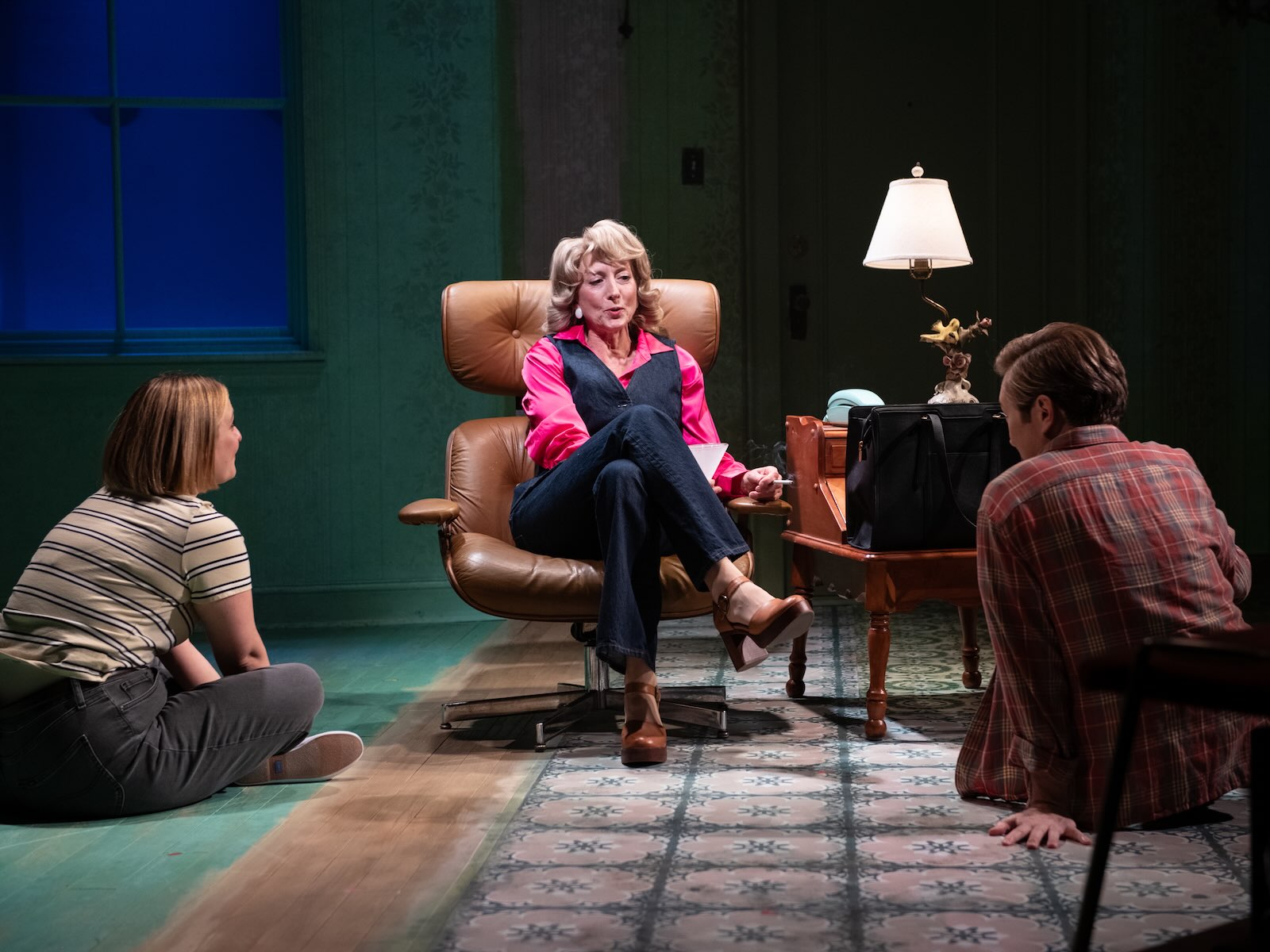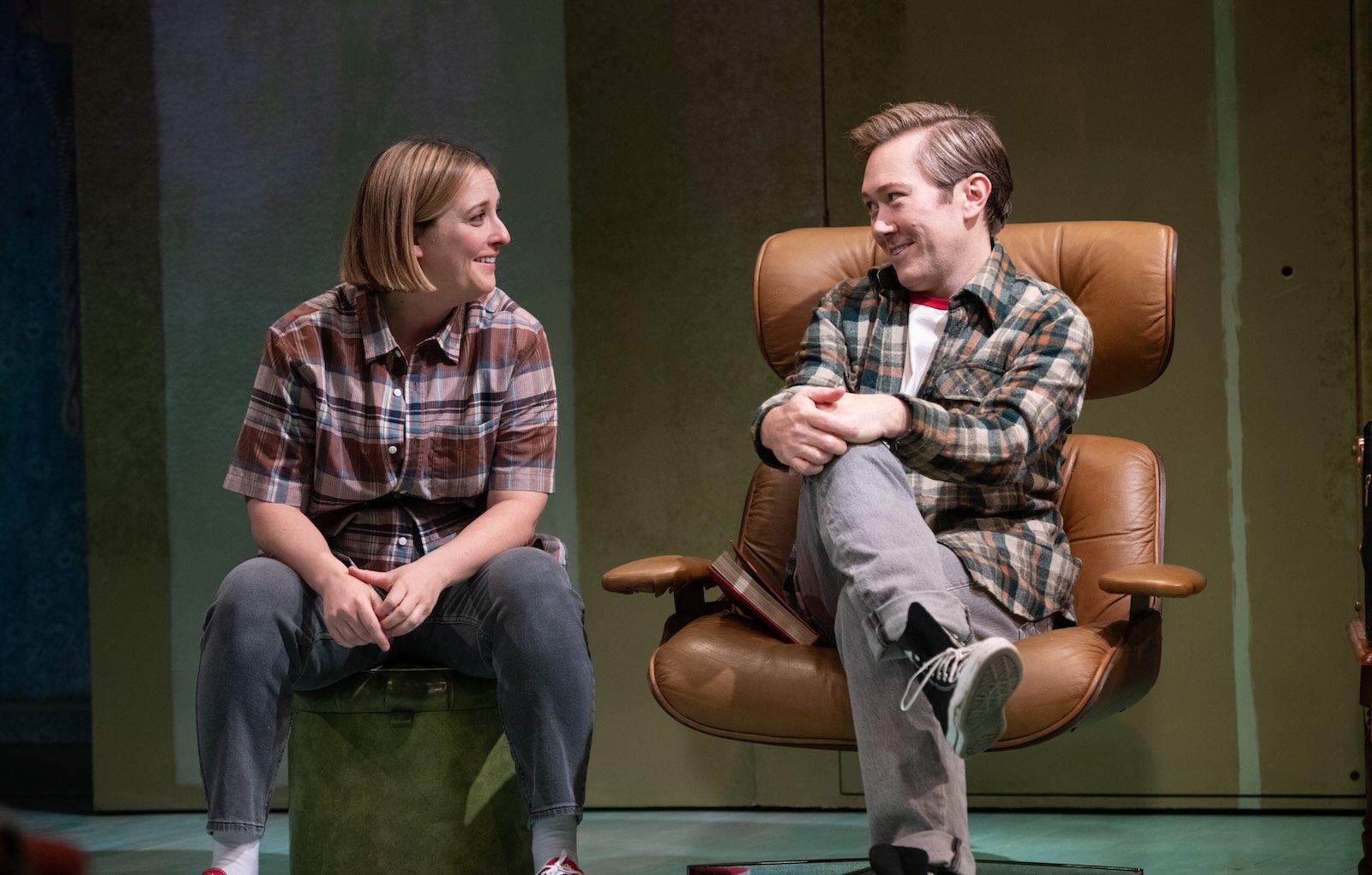Toward the end of Paula Vogel’s The Mother Play: A Play in Five Evictions, Phyllis Herman blurts out to her daughter Martha, “I never wanted to be a mother … it’s a life sentence.” Her declaration is hardly a spoiler. Phyllis’s dubious parenting skills have been on display from the first moments of this emotional drama, which spans nearly 40 years of the Herman family’s life, beginning in the mid-1960s.
Phyllis, her son Carl, and her daughter Martha live an uneasy, peripatetic existence, packing and unpacking their lives in a string of DC-area apartments. As a divorced woman raising two children on her own, Phyllis can initially afford only janitorial quarters — spaces that come with garbage duty, dim light, and swarms of roaches. When she complains, the family is tossed out like the jetsam they tend to.
One might expect a mother who holds it together under such circumstances to be heroic. But Phyllis is anything but fearless. She is, by turns, boozy, narcissistic, and delusional. Her love for her children is often conditional. When Carl and then Martha come out as gay, she wails, “Was it too much to ask for one normal child?”

The Mother Play debuted on Broadway in 2024 and is now playing at Studio Theatre under the restrained yet resonant direction of New York–based Margot Bordelon.
Veteran DC actress Kate Eastwood Norris reveals Phyllis’s myriad imperfections. Portraying her from her mid-thirties into her late seventies, Norris conveys immense pride and ferocity, laced with shame and vulnerability.
Zoe Mann (Martha) and Stanley Bahorek (Carl) forge a bond of true, unconditional love. Together, they haul the family from pillar to post. Carl tenderly protects Martha from school-bus bullies; years later, when Carl becomes ill, it is Martha who cares for him. Both actors navigate the decades believably, accumulating stores of both bitterness and grace. Martha’s maturation, from an awkward pre-teen to a seasoned, middle-aged woman, is wonderfully communicated through Mann’s posture, movement, and voice. Similarly, Carl’s embrace of his sexuality is subtle at first, then believably more obvious through Bahorek’s splendid portrayal of a man finding his true self.

Vogel has long woven autobiographical threads into her work. The Baltimore Waltz (1988) explored her relationship with her real-life brother Carl, who died of AIDS. Here, Martha — referenced as a writer — serves as the playwright’s stand-in.
As the Hermans move through the decades, Vogel reminds us that not all evictions are physical. Some are interpersonal. Phyllis was shunned by her own parents for marrying a Jew. She, in turn, distances herself from her children when their life choices repel her. Ultimately, she is evicted from her own psyche by the encroachments of age.
Though the play is engrossing, we are left to wonder about the Hermans’ backstory. We never learn why Phyllis’s marriage failed or how she reconciled with her mother — whom she speaks to daily and mourns deeply when both parents die. Additional insight into Phyllis’s other family relationships might have amplified the play’s emotional impact. Structurally, Vogel includes an oddly prolonged wordless sequence in which Phyllis wanders her apartment — often offstage — primping and fixing herself a drink. While it conveys her suffocating loneliness, the segment interrupts the otherwise well-crafted dialogue between mother and children, leaving us temporarily in an airless space.
Set Designer Krit Robinson outfits the family’s journey with well-worn furnishings that follow the Hermans from home to home. Projection Designer Shawn Boyle marks the passage of decades with an increasing number of light-filled windows, signaling the family’s gradual rise from dreary basements to upper floors. Other projections plunge us from an infested cellar into an ’80s disco with splendid effect. Sinan Refik Zafar’s sound design transports us through decades of pop music, embracing the sounds that defined each era. Costume Designer Danielle Preston nails the passing fashions; Phyllis’s wardrobe, in particular, charts changing styles and her enduring vanity. Her flowy chiffons and bouffant wigs make us wonder whether, over time, she has spent a lot more on herself than on her kids.
If we needed further proof of Tolstoy’s famous observation that “every unhappy family is unhappy in its own way,” Vogel’s quirky The Mother Play: A Play in Five Evictions offers a vivid, complicated portrait of one family’s particular disharmony. But it also holds out the possibility of reconciliation. Even in relationships hobbled by lifelong conflict, Vogel’s characters struggle toward a sweet, if compromised, peace.
Running Time: 90 minutes with no intermission
The Mother Play: A Play in Five Evictions plays through January 4, 2026, in the Mead Theatre at Studio Theatre, 1501 14th Street NW, Washington, DC. For tickets (starting at $42), go online, call the box office at 202-332-3300, email boxoffice@studiotheatre.org, or visit TodayTix. Studio Theater offers discounts for first responders, military servicepeople, students, young people, educators, senior citizens, and others, as well as rush tickets. For discounts, contact the box office or visit here for more information.
The program for The Mother Play is online here.



